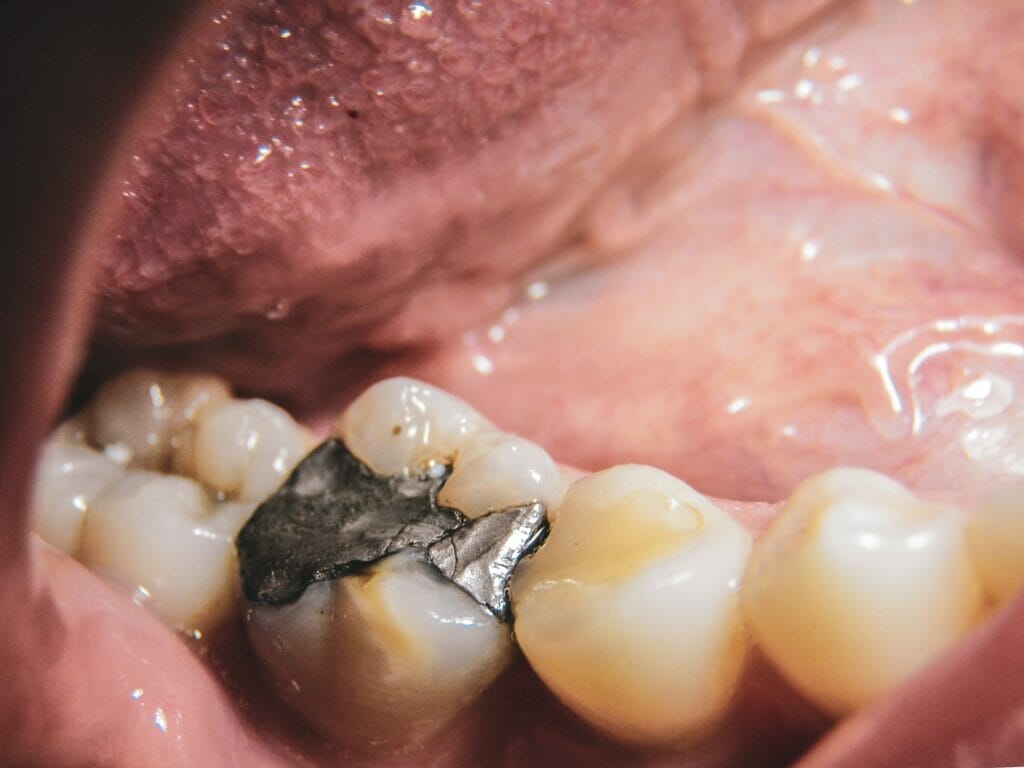
Hi! My name is Dr. Kyle Hornby and I'm a Kitchener-Waterloo Family Dentist. Each week, I take a few hours to write really original articles about dental care and treatment. My goal is to give you information you're not likely to get at your regular dental checkups and treatment consults. Today, I'd like to talk about amalgam filling replacement so you can better understand if it's the right thing for you.
Amalgam fillings look unnatural and are inorganic. Given the increasing (and well-warranted) interest in health and wellness, this has been the basis for a campaign against the use of amalgam fillings in Dentistry.
The main concern with amalgam filling (also known as silver fillings) centers on the fact that they contain mercury, which may have toxic effects on our nervous, digestive and immune systems. In fact, mercury is one of the top 10 chemicals of major health concern according to the World Health Organization (WHO).
But does mercury even come out of the solid fillings we may have in our mouths?
Aren't we exposed to low concentrations of other harmful chemicals on a daily basis?
Should we be concerned about amalgam dental fillings with respect to our overall health?
If you want an inside perspective on silver filling replacement, read on so that you can make an educated decision about if it's really right for you.
First, let's get a bit more detailed about the amalgam and mercury...
First off, what is an amalgam filling made of?
Well, your silver fillings are made of Mercury, Silver, Tin and Copper. You may be wondering, "why mercury?" and the answer is that Mercury binds the alloy of Silver, Tin and Copper together into a durable, solid filling. Mercury has some pretty unique properties and that's probably why nobody was able to come up with a replacement ingredient once fears surrounding amalgam fillings began to arise.
So, does mercury escape our dental fillings causing continuous exposure? If so, how much mercury do we absorb on a daily basis from amalgam dental fillings?
First off, yes we do absorb mercury from our amalgam dental fillings.
For perspective, Health Canada estimates that we are exposed to 9 millionths of a gram of mercury per day from all sources. Of this, dental amalgam is responsible for about a 3 millionths of a gram daily exposure. According to the FDA, the vast majority of peer-reviewed evidence suggests there is no adverse health effect associated with dental amalgam.
While dental amalgam is a proven source of low-concentration mercury exposure, it's important to understand that the amalgam toxicity question is complex in nature.
Why?
Well, let's answer that question by exploring our top 3 secrets about amalgam filling replacement.
Removal of amalgam dental fillings causes a spike in exposure to mercury in both vapor and particulate forms. Add to that the fact that tooth-coloured, composite resin filling alternatives contain non-organic and potentially toxic materials and you have lots to think about when choosing a dental filling material.
It makes the choice between keeping functional amalgam fillings and replacing them a very difficult one.
Other parameters, including the higher longevity (and less frequent need for replacement) of dental amalgam versus composite resins increase the challenges that come with making the correct decision.
Let's get to our top 3 secrets about amalgam filling replacement

While we do get some daily mercury exposure with amalgam fillings, it is limited by the fact that the filling is in a solid state and most of the material is beneath the tooth's surface.
In contrast, having the same volume of dental amalgam in liquid or small particle form in the mouth would lead to much larger exposures. This is simply because, in these forms, our saliva is in contact with a greater surface area of filling material.
In a solid state, there is far less surface area of the amalgam material exposed to our body.
Now, when you replace an amalgam filling, you are drilling into it, creating small particles and mercury vapors in the process. The result is that you're experiencing a massive spike in mercury exposure.
Even clinics that claim to provide safe removal can't guarantee that you won't be exposed to both particulate and vapor forms of mercury.
These clinics may employ high-suction vacuums and plastic barriers or dental dams to minimize exposure.
While these added safety measures can be helpful, for sure, amalgam filling particles will leak below the dental dam into your mouth, and the vacuums do not absorb all mercury vapor.
Now, if you have to replace an amalgam filling because it's breaking down, failing or has a cavity beneath it, then replacing it is a no-brainer. If, however, you're considering replacement because somebody told you amalgam fillings are bad for your health, then you've got a more difficult decision on your hands.
Simply put, removing dental amalgam spikes your exposure to mercury.
What are composite resins made of? They look tooth-coloured and benign but appearances can be deceiving as they contain a slew of non-natural chemicals as well.
The varying composite resins on the market differ slightly in composition. Here are a few chemicals in composite resin fillings that can be toxic:
When they are placed by your Dentist (pre-hardening), you absorb some of these chemicals from dental composite resin. After placement, friction from chewing and contact with both natural (gastric) and dietary (citrus) acids also leads to release of these chemicals and ions.
Additionally, dental composites wear down more quickly than do their dental amalgam counterparts. This means more wear of the surface layer releasing components of the filling into your saliva.
So what should you do?
Well, I wouldn't advocate against the use of dental composite resin (or amalgam for that matter) based on the fact that they're artificial and contain potentially toxic materials. I simply want to make the point that dental composite resin can expose you to chemicals and toxins as well.
Ultimately, letting cavities grow will result in harmful dental abscesses (infections) and eventually tooth loss.
So, in my opinion, the benefits of treating dental disease far outweigh the small exposure risks with amalgam and composite resin fillings.
My goal here is to give you information to help you make a choice on dental materials that you're comfortable with in the long run!
Every time you have dental work completed, things need to heal. Most importantly, placing (and replacing) dental fillings causes some level of irritation to your tooth's nerve. After treatment you may experience sensitivity to temperature extremes or chewing pressure.
The term for this is pulpitis (meaning inflammation of your tooth's nerve).
So, we often take for granted the capability of our nerves to heal post-treatment.
But, what happens when the nerve doesn't heal?
Well, unfortunately, a tooth that just isn't settling down must be treated with a root canal treatment. And, it's possible that your tooth's nerve won't settle down after amalgam filling replacement.
So, while the chances of this happening are on the lower side, you'd probably find it frustrating if it happened after replacing a serviceable and functioning amalgam filling. That is, you probably wouldn't want to look back knowing that you could've avoided a root canal treatment.
Another not uncommon occurrence is chipping of cusps during amalgam filling replacement. Again, this does not happen frequently but, if the chip is large enough, it could render your tooth in need of a dental crown or cap.
As a Dentist, part of my job is to have good instincts for when less is actually more. What I mean by this is that I should be able to tell you when the cost-benefit calculation on treatment is in your favour while identifying times when it just isn't.
Replacing amalgam fillings can bring need for additional (sometimes preventable) treatments so it's important to really consider if you want to replace a serviceable, intact amalgam filling.
I'll keep it brief in summary, today. Safety of dental amalgam has been a hot topic for a while now. I certainly respect everybody's feelings and perspectives on what is safe for them.
My goal today was to make you aware of some bits of information that often go unmentioned when talking about the need for filling replacement.
So, while dental amalgam does contain potentially toxic mercury, dental composite resin alternatives contain potentially toxic materials as well.
Add to that the spike in mercury exposure you get with dental amalgam removal and the decision to switch gears toward dental composite becomes a not-so-clear-cut decision.
Lastly, it's important to know that some seemingly routine dental work can lead to additional dental work that you really didn't plan for.
As always, if you have questions, please contact me at info@enamelrepublic.com.
Thank you for reading!
By Dr. Kyle Hornby, Kitchener Dentist
Our Dentist Office is located in Downtown Kitchener, Ontario. We are a short drive away for families in Waterloo, Breslau & St. Jacobs. Our central location means we truly offer family dentistry near you!
This article is not intended to be a substitute for professional advice, diagnosis, or treatment. Accordingly, always seek the advice of your Dentist or other healthcare providers regarding a dental condition or treatment.
Services
Routine Dentistry & Tooth Repair
Oral Surgery & Tooth Removal
Prosthetic Dentistry & Tooth Replacement
Protective/Preventive Services
Teeth Whitening
Schedule an Appointment Now
